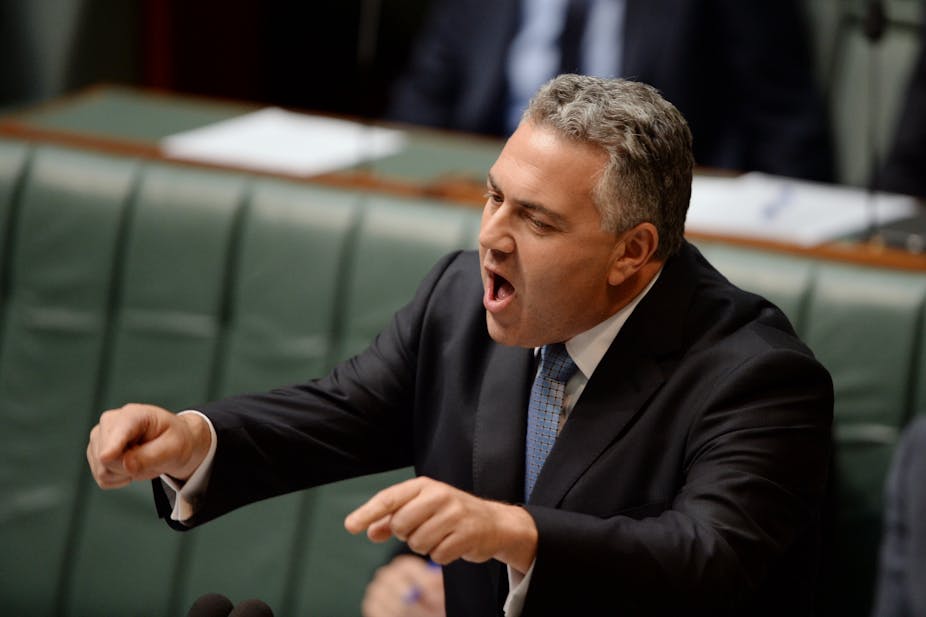Despite its agonising birth, Joe Hockey will harbour hopes his first budget has taken him one step closer to his goal of eventually becoming prime minister.
Any doubt about the Treasurer’s ambition would have been swept away by Wednesday’s post-budget speech.
Eschewing a nitty gritty numbers-based address, Hockey delivered a general political pitch – “this budget is based as much on values as it is based on the economic need” - laced with anecdotal folkiness. It was the feisty performance of an aspiring leader.
The language of Hockey’s personal crusade against “the age of entitlement” has infused the government’s policy and rhetoric and defined the budget. It gels with the “dry” philosophy, focused on individual responsibility and small government, that is the contemporary Liberal party’s centre of gravity. “Joe was seen as doing well,” says one Liberal backbencher.
This is despite the hubristic cigar (an image now with him forever) and Thursday’s unfortunate choice of comparisons in trying to put the $7 Medicare co-payment into perspective. “You can spend just over $3 on a middy of beer, so that’s two middies of beer to go to the doctor. One packet of cigarettes costs $22. That gives you three visits to the doctor.”
It’s hard to separate precisely the contributions of Hockey and Abbott, who chaired the expenditure review committee all through. One reason is that Abbott’s positions on issues have shifted around so much over the years, as a glance at “Battlelines” shows (for example on means testing family benefits).
There was a perception on occasion of some jockeying between the Hockey and Abbott offices on the management of the pre-budget messaging.
One thing is clear. The budget has been very costly to Abbott’s political credibility. He rode to government on the bike of “trust”, and he’s taken a bad tumble. He’s lost skin that may never regrow. All leaders break promises but this has been spectacular. It makes it hard to predict him from here on - one can’t be sure of his political compass anymore.
Labor has flagged it will try to block multi-billions worth of measures, including the Medicare co-payment, the crackdown on the young unemployed and ending Family Tax Benefit B when a family’s youngest child turns six.
Bill Shorten in Thursday’s budget reply didn’t bother putting any alternative policies – he just surfed on all the negatives. Hockey tried to make something of this, but throwing out a token policy or two this early would be simply confection.
The Greens and Clive Palmer’s PUP are also on the warpath against some central measures.
But the two “broken promise” tax hikes – the levy on those with incomes of more than $180,000 and the restoration of petrol excise indexation – are expected to pass, despite ALP opposition to the indexation. Shorten says Labor is still considering the income tax levy – but it is not likely to vote against it.
With the complication that the budget legislation will span the existing Senate and the new one, where PUP will be critical, it is near impossible to know how some measures will fare. Clive Palmer is throwing grenades but there’s no track record to indicate how he might behave in negotiations.
Of the big measures the Medicare co-payment certainly looks at high risk. (That would also take out the proposed medical research fund, the genesis of which came from Hockey.)
There was some breathless hype about a possible double dissolution after Tony Abbott said that “this lot of [Senate] independents would be unlikely to keep their seats if there was a new election”.
Would Abbott go to an election on frustrated budget measures, such as the GP co-payment? Hardly.
(He did promise before the 2013 election he would have a double dissolution if the carbon tax wasn’t repealed. But the new Senate is likely to end it – anyway, promises aren’t what they were.)
This government will do what governments generally do with difficult Senates. Negotiate. Browbeat where it can. Compromise. It will win some and lose a few.
The battle with the states is more interesting even than the Senate tug of war. The budget’s plan to cut huge dollars from projected hospitals and schools funding – on the rationale that they are state responsibilities – is designed to save money, rewrite federalism, and kick start a debate about the GST.
The Liberal premiers of NSW, Victoria and Queensland, all facing elections soon, are angry. A meeting of first ministers on Sunday will indicate how far they’re willing to escalate the row.
Hockey is trying to goad the states into asking for reform of the GST, a bold ploy though not one likely to make him friends.
How the budget’s approach goes down in the community is its ultimate test. The first indication will be the immediate polls, predicted to be bad, but the real verdict won’t come for a while. Some measures will be slow burn.
Notwithstanding the harshness of many initiatives, Coalition backbenchers seemed more relaxed at week’s end than when they arrived in Canberra. The pre-budget shambles had unnerved them. They now feel they have a narrative, even if a grim one.
“All budgets are merely promises. What you are judged by is whether you can deliver,” a frontbencher notes. A backbencher asks the very pertinent question: “Does the leadership have the ability to sell what they have philosophically prepared in this budget – their program to change the nation?”
Listen to the Politics with Michelle Grattan budget podcast with Finance Minister Mathias Cormann and Shadow Finance Minister Tony Burke here.

